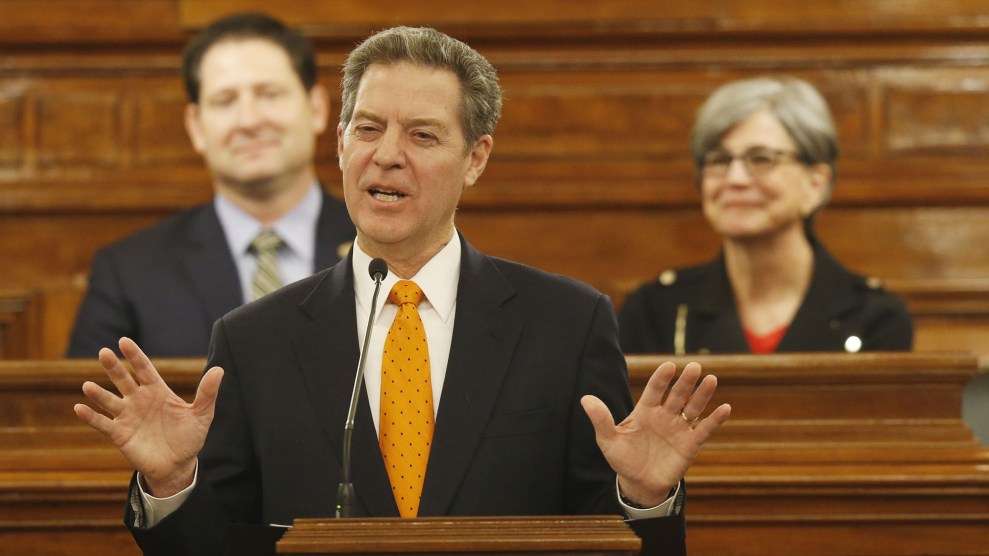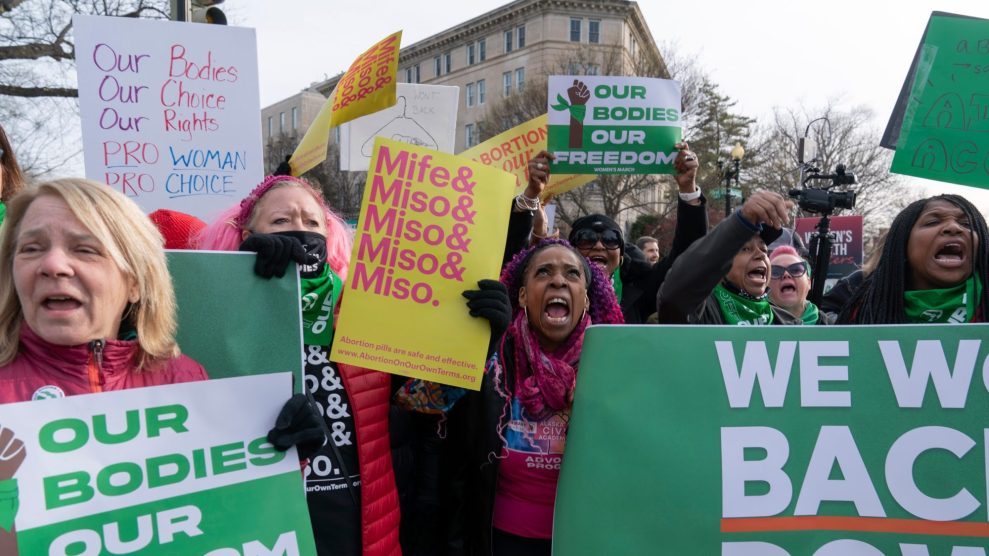
Kansas Gov. Sam Brownback delivers his annual State of the State address on the floor of of the Kansas House of Representatives in January.Bo Rader/TNS/ZUMA
An ambitious effort by a Republican governor to drastically cut his state’s taxes is crumbling—and that’s a bad omen for Donald Trump and Republicans in Congress who are hoping to slash tax rates at the national level.
Shortly after he became governor of Kansas in 2011, Sam Brownback went to work on rewriting the state’s tax code. Together with the Republican-dominated legislature, he eliminated the top income tax bracket, lowered everyone else’s income tax rate, and created a loophole that allowed some business owners to pay no state income taxes at all.
Brownback sold the cuts as a way to jolt the Kansas economy to life, promising major job growth thanks to the lower tax rates. To pass these tax measures, Brownback worked to replace moderate Republicans in the legislature who opposed his ideas with true-believer conservatives. He helped knock off nine moderate Republican incumbents, and the effort paid off when his tax reform passed in 2012.

But instead of the miracle growth that Brownback promised, the tax cuts have left a widening crater in the state budget. State economic growth has lagged behind the national pace, and job growth has stagnated. Lawmakers have been left scrambling each year to pass unpleasant spending cuts when tax revenue comes in below expected levels, leading to contentious fights in the legislature and state courts over reduced public school funding. When the state legislature convened last month, it faced a $320 million budget shortfall that needed to be closed before the end of the current fiscal year in June—and a projected additional $500 million shortfall for the next fiscal year.
After more moderate Republicans joined the GOP-dominated legislature following last November’s election, the party has appeared more willing to concede defeat and ditch Brownback’s tax experiment. Last week, the state House and Senate passed a bill that would generate more than $1 billion by eradicating most of Brownback’s reforms. It would raise personal income tax rates (though still not as high as the pre-Brownback rates) and end the loophole that has allowed 330,000 business owners—including subsidiaries of Wichita-based Koch Industries—to avoid paying income taxes.
The fate of that bill is still in doubt. Brownback vetoed the measure on Wednesday morning, after explaining, “I am vetoing it because the legislature failed to fulfill my request that they find savings and efficiencies before asking the people of Kansas for more taxes.” But the House quickly fought back, voting 85-40 to override the veto. But late Wednesday afternoon, the Senate fell three votes short of the the two-thirds majority necessary to pass the law without Brownback’s approval, leaving the fate of the state’s tax system uncertain.
So what’s all of this got to do with Trump? Brownback’s failures could complicate national tax-reform efforts, which have been high on the Trump administration’s agenda. “Lowering the overall tax burden on American business is big league,” Trump told airline executives earlier this month. “That’s coming along very well. We’re way ahead of schedule, I believe. And we’re going to announce something I would say over the next two or three weeks that will be phenomenal in terms of tax.”
Like many of Trump’s policy plans, his tax agenda remains largely a mystery. But the proposal he outlined during the presidential campaign shared many features with Brownback’s experiment. It would slash personal income tax rates and reduce the number of brackets. It wouldn’t eliminate business income taxes, but it would lower them to 15 percent, allowing many super-wealthy Americans to avoid paying high tax rates by funneling their income through their businesses.
That’s not entirely coincidental. Trump and Brownback share a tax guide: Reaganomics guru Art Laffer. Laffer is best known for the Laffer curve, a diagram of his hypothesis that lowering tax rates could increase tax revenue by boosting economic output. Kansas paid $75,000 for Laffer to spend three days consulting with lawmakers on the state’s tax plans. Laffer also visited Trump Tower to consult on tax reform last year, and in December he called Trump’s campaign tax plans “terrific.” When Trump’s treasury secretary nominee went before the Senate last month, Trump’s transition press office emailed reporters a list of endorsements that started with glowing praise from Laffer. “Steven Mnuchin is a wonderful choice for Treasury Secretary,” Laffer said. “He has a great understanding of finance, markets, and housing. He is committed to tax reform that will get our economy growing, create jobs, and make America the best place to do business.”
By now, it’s clear that Brownback’s tax experiment hasn’t produced the growth he promised. But that hasn’t put an end to Republican efforts to replicate it on the national level. In December, Brownback suggested to the Wall Street Journal that Kansas’ tax reforms could offer a model for Trump. And on Thursday morning, Brownback is scheduled to speak—almost certainly about his taxation model—at the annual Conservative Political Action Conference in Washington, DC, on a panel titled “How Governors are Reclaiming America’s Promise.”
















